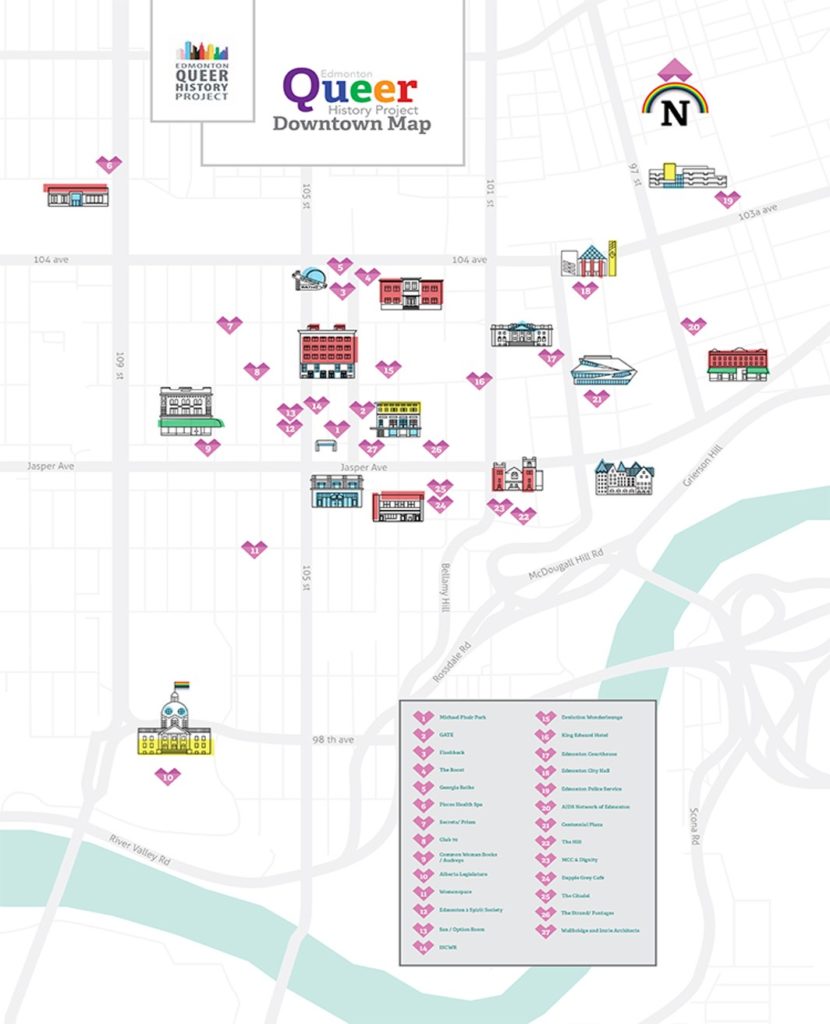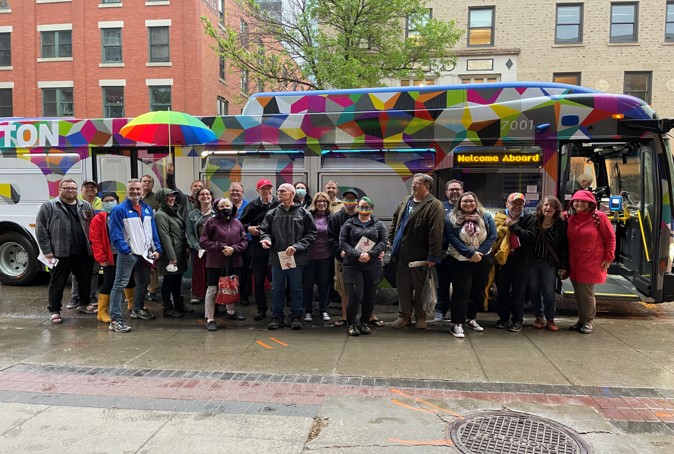Edmonton Queer History Project: Heritage Placemaking as Community-Engaged Social Justice
2SLGBTQ+ histories (Two Spirit, Lesbian, Gay, Bisexual, Trans, and Queer) are often missing from local history texts and public archives, absent from educational curricula, and invisible on urban streets. In Edmonton, the innovative Edmonton Queer History Project (EQHP) is working to spotlight these “closeted” stories and places and helping inspire and connect a new generation.
What began in 2015 as a multi-media exhibit “We Are Here” at the Art Gallery of Alberta to celebrate the 35th anniversary of Edmonton’s Pride Festival, then became part of a travelling exhibition reaching two dozen rural communities across Alberta, and has blossomed into a sprawling initiative including a beautifully illustrated printed downtown map featuring 27 of Edmonton’s queer historical landmarks, an interactive educational website, history of pride timeline, and a podcast series showcasing local queer histories, including former Premier Alison Redford. EQHP is now working with the City of Edmonton to create queer heritage place-markers throughout the downtown and is planning a new summer series of guided walking tours. All designed to help make this invisible history become visible and come to life.

EQHP represents a dynamic university-community project, spearheaded by a diverse team of artists, elders, seniors, business owners, students, and local academics, Dr. Kristopher Wells (Canada Research Chair, MacEwan University) and Dr. Michelle Lavoie (Postdoctoral Researcher, Centre for Sexual and Gender Diversity, MacEwan University). The project also brings together an array of community partners including the Edmonton 2 Spirit Society, The Citadel Theatre, Edmonton Downtown Business Association, and many others.
“The downtown places we’ve identified as part of our queer history project are entry points, almost invitations, to tell wider stories that are of community interest,” explains Wells, weaving together a tapestry of people, places, moments, documents, and records. “Our goal,” Lavoie adds, “is to try to have as many ways into this hidden history as possible. It is very important for us to engage different audiences by having multiple entry points – digital pieces, archival documents, heritage sites – and interweave these different ways of understanding.” EQHP started first by identifying and researching heritage places in the downtown because traditionally queer people have gathered in city centres for privacy and anonymity reasons.
The array of EQHP sites chart the ups and downs of Edmonton’s 2SLGBTQ+ community – identifying both sources of pride and protest. For instance, the Pisces Health Spa (10508- 109th Street) was the site of Edmonton’s “Stonewall moment”. The May 30, 1981 raid on the spa by Edmonton Police Service’s “Morality Unit,” the largest mass arrest in Alberta’s history, was devastating for the local 2SLGBTQ+ community. But it was also a catalyst pulling together community members and supporters, propelling key figures like Michael Phair into community leadership and civic politics, and launching the Privacy Defense Committee of Edmonton, a groundbreaking law reform group.

Another EQHP site documents the history of Edmonton’s first feminist bookstore, Common Woman Books. Launched in Halyna Freeland’s (Hon. Deputy Prime Minister Chrystia Freeland’s mother) home basement, it was the first bookstore cooperative in the city to use the word “Lesbian” for its section on lesbian resources and fiction, and paved the way for future queer bookstores like Orlando, Audrey’s, and Glass Bookshop.
For Lavoie, mapping places with the EQHP project and creating educational tools is not an end in itself: “It is about building 2SLGBTQ+ intergenerational communities, and building those connections that start with this work. On bus and walking tours we have organized, the visits spark conversations and more stories and significant new places of interest inevitably emerge.” And as Edmonton starts to lose its seniors and elders who fought for queer rights and privileges, the gathering of this oral history takes on real urgency, as does archiving the community newspapers and ephemeral documents that chronicle local 2SLGBTQ+ life.
Shortlisted for a 2022 Governor General’s History Award for Excellence in Community Programming, a key part of EQHP’s current work focuses on digitizing and archiving the often ephemeral paper trail of the queer community – community newsletters, papers, journals, personal and court records – and launching a new “more democratic” digital map that will allow community members to identify places of significance to them across the city.
“What our project demonstrates is that Queer history happens everywhere, you just need to know where to look to find it,” Wells reflects. “We hope the Edmonton Queer History Project inspires other cities to delve into and gather the histories of their own 2SLGBTQ+ communities. Because we know the stories are there waiting to be shared and celebrated.”

Queer Edmonton. Photo: Kristopher Wells.

